Mega Skills
TRY MEGA SKILL CENTRE
Mr.Utpal Dutt established An Organization Name “TRY” 19 years ago and today is carrying out developmental work in many states of the country. He started his journey with a hopeful belief. Change is the only path to development. Keep trying to take forward the thinking of people of every section of the society about how to achieve overall development of those who are lagging behind economically and socially.
TRY is well known to address Health, education and socio economics issues and problems with potential measure and efforts to resolve under the guidance and support of Government and active involvement of local stakeholder.
HIV/AIDS: TRY is working as a Project Management Unit (PMU) at the state level in Jharkhand for HIV/AIDS. They likely oversee and coordinate various initiatives and programs related to HIV/AIDS prevention, treatment, and support. (2020)
TI Project: TRY is implementing a TI (Targeted Intervention) project in two districts of Jharkhand. TI projects focus on providing specific interventions and services to key populations who are at high risk of HIV infection, such as sex workers, injecting drug users, and men who have sex with men.
Hospitals under Tribal Welfare: TRY is running two hospitals under the Tribal Welfare department of the Jharkhand government. These hospitals likely cater to the healthcare needs of tribal communities, providing medical services and specialized care.
TB Intervention: TRY is involved in TB (Tuberculosis) intervention programs in 17 districts of Jharkhand as well as in Bihar of 7 District. These programs likely include activities related to TB awareness, screening, and diagnosis, treatment, and support services.
YOGA project under Ayush: TRY is working on a YOGA project under Ayush. Ayush is a flagship healthcare scheme in India and the YOGA project may involve promoting and providing yoga-based interventions for health and well-being.
Panchayati Raj project in Godda district: In recent years, TRY has extended its work to Godda district, focusing on a project related to Panchayati Raj. Panchayati Raj refers to the decentralized system of local self-government in rural areas and TRY may be involved in initiatives aimed at strengthening governance and community development in the Godda District.
Jharkhand Skill Development Mission Society (JSDMS) acts as the nodal organization for all Skill Development related activities in the state, helping to achieve the goal of an effective and efficient skill training effort. All the skill development schemes that were implemented by JSDMS are now brought under an umbrella scheme – Mukhymantri Sarthi Yojna (MMSY) with another additional sub-scheme – Block Level Institute for Rural Skill Acquisition (BIRSA). The Mission has addition programs under its banner, namely Saksham Jharkhand Kaushal Vikas Yojana (SJKVY), Deen Dayal Upadhyaya Kaushal Kendra (DDU- KK) popularly known as Mega Skill Centers, and Employability Excellence with College Education & Learning (EXCEL), Recognition of Prior Learning (RPL) works on the Public-Private Partnership Model (PPP) and collaborates with private domain training providers referred to as Training Service Providers (TSPs) under the Jharkhand Skill Development Mission Society (JSDMS) ecosystem.
ACADEMIC FACILITIES: – IN MEGA SKILL CENTRE.
- Administrative Building: This is the main building where the administrative offices are located. It houses facilities like the principal’s office, administrative staff offices, and other administrative functions.
- Principal’s Office: The office of the principal, who is the head of the institution and responsible for overall administration and management.
- Assembly Point: A designated area where students and staff can gather for assembly or other group activities.
- Classrooms: There are more than eight classrooms available for conducting academic sessions and lectures.
- Laboratories: The skill centre has four laboratories equipped for practical training and experiments in various skills or subjects.
- Reception Area: A Designated areas where visitors, students, and staff can inquire about information, receive guidance, or seek assistance.
- Counsellor Area: An area specifically allocated for the guidance and counseling services provided to students.
- Placement Cell Area: An area dedicated to the activities related to career placement and job opportunities for the students.
- Playground Area: An outdoor space where students can engage in sports and other recreational activities.
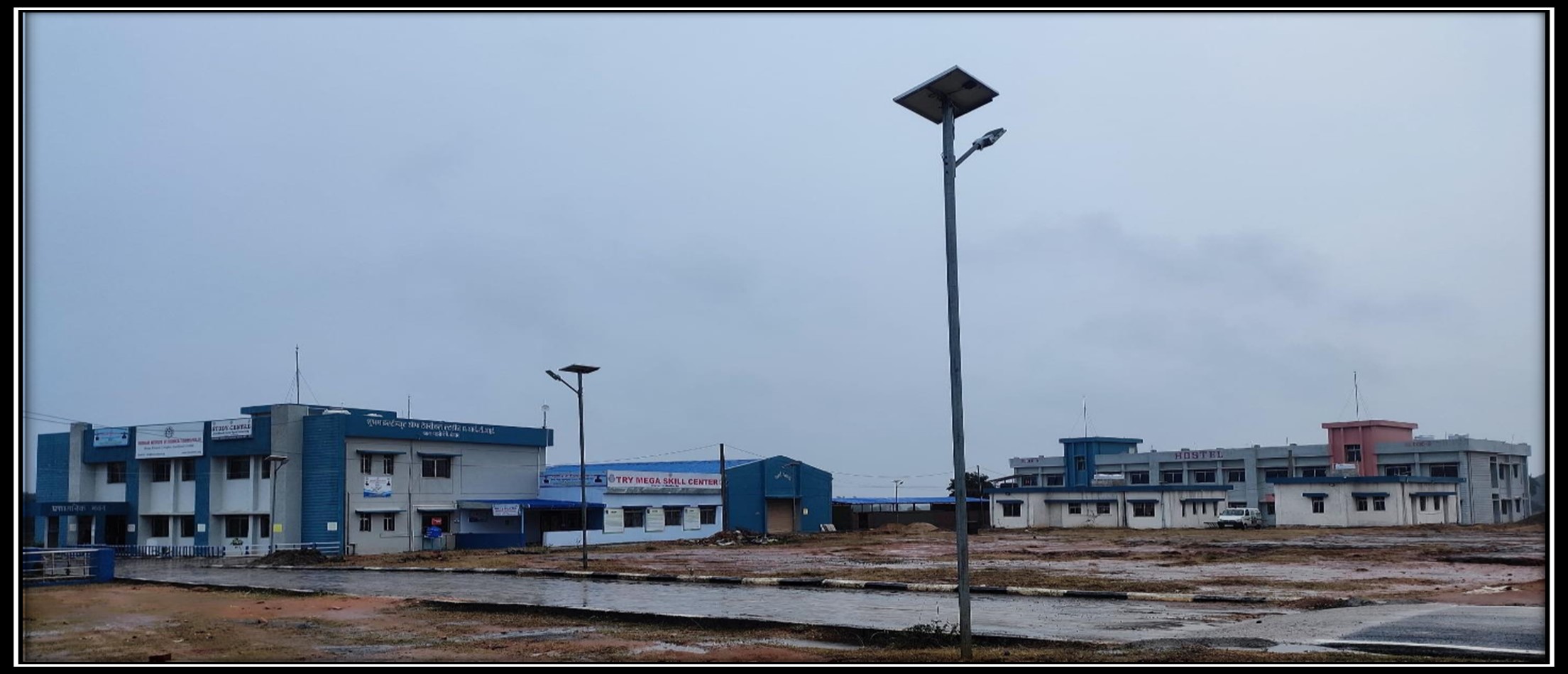
- Staff Lounge: A designated area where the staff can relax, interact, and have their meals during breaks.
- Staff Toilets: Restroom facilities specifically designated for the staff members.
- Boys Toilets: Restroom facilities specifically designated for male students.
- Girls Toilets: Restroom facilities specifically designated for female students.
- Boys Hostel: Accommodation facilities for male students who require on-campus housing.
- Girls Hostel: Accommodation facilities for female students who require on-campus housing.
- Karamchari Awas: Housing facilities provided for the support staff or employees working at the skill centre.
- Boys Canteen: A dedicated eating area or cafeteria for male students.
- Girls Canteen: A dedicated eating area or cafeteria for female students.
These facilities collectively support the academic and non-academic needs of the students and staff at the Mega Skill Centre.
TRY the following courses are offered
- General Duty Assistant: This course provides training in basic healthcare and patient care skills. Students learn about medical terminology, infection control, first aid, and assisting patients with activities of daily living.
- Medical Dresser: This course focuses on equipping students with the necessary skills to assist medical professionals in dressing wounds, applying bandages, and providing basic care to patients. Students learn about wound care techniques, sterilization methods, and medical terminology.
- Assistant Electrician: This course is designed to train individuals in the fundamentals of electrical systems and installations. Students learn about electrical safety, circuitry, wiring techniques, and troubleshooting common electrical problems. This course prepares students for entry-level positions as electrical assistants.
- Solar Panel Installation: This course provides training in the installation, maintenance, and repair of solar panels and solar energy systems. Students learn about solar panel technology, electrical connections, system design, and safety procedures. This course prepares students for careers in the renewable energy industry.
- Sewing machine operator: Being a sewing machine operator can be a fascinating job Whether you’re working in a factory setting, creating intricate designs, or handling large-scale production, your role is crucial in the garment and textile industry.
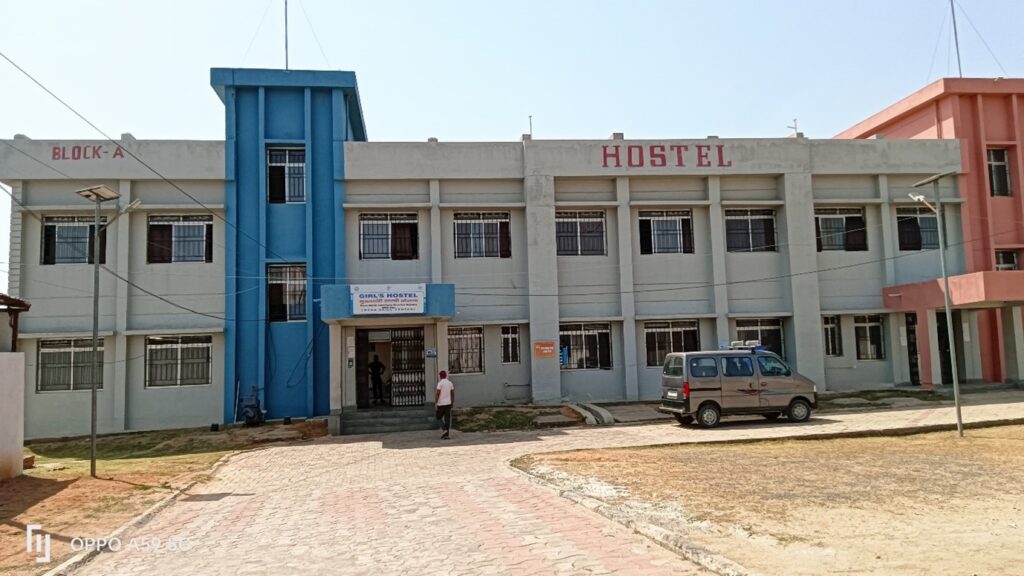
HOSTEL FACILITIES
- Accommodation: Rooms or dormitories are provided for students to stay during their course duration.
- Security: Measures are taken to ensure the safety and security of the students residing in the hostels.
- Common Areas: Common areas such as lounges or recreation rooms may be available for students to relax and socialize.
- Dining Facilities: Access to dining halls or mess facilities where meals are provided.
- Hygiene and Cleaning: Regular cleaning and maintenance of the hostel premises to ensure cleanliness and hygiene.
- Laundry Facilities: Provision for laundry services may be available for students to wash their clothes.
- Wi-Fi: Internet connectivity is often provided to allow students to access online resources and stay connected.
- Maintenance Staff: There may be staff members available to address any maintenance or repair needs within the hostel premises.
FOR 100% PLACEMENT
Reach out to organizations, educational institutions, and companies that might be interested in hiring trainers. Provide them with details about the event and the benefits of participating. Offer them booths or spaces where they can interact with trainers and showcase their opportunities. Utilize various channels to promote the job fair. These include online platforms, social media, industry-specific websites, professional networks, and local media outlets. Create visually appealing marketing materials and use targeted messaging to attract trainers. Collect trainer information: Ask trainers to register for the job fair by submitting their resumes or filling out application forms. This will help you gather information about their skills, qualifications, and areas of expertise. Organize this information in a systematic manner for easy reference during the event. Set up booths, tables, and signage for the participating employers.
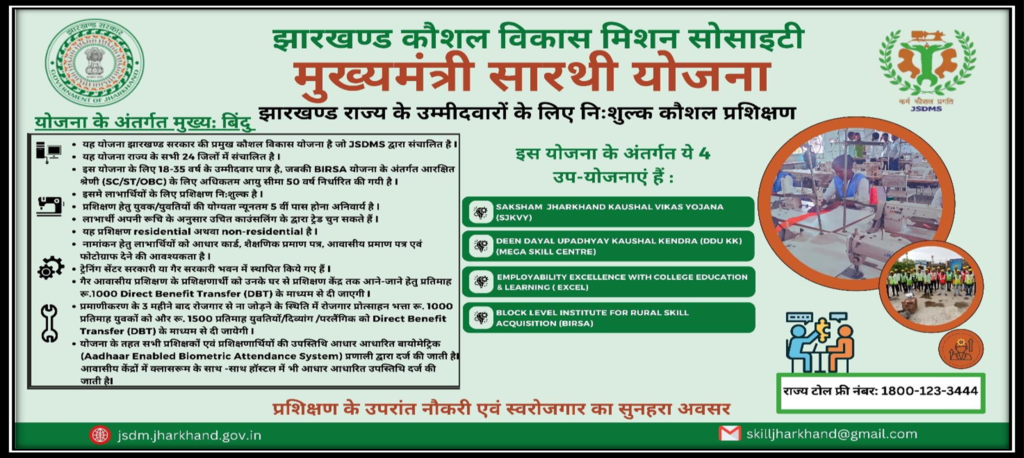
Ensure that the venue has adequate seating, networking areas, and facilities for presentations or interviews. Create a professional and welcoming environment for both trainers and employers. Plan various activities to engage trainers and employers during the job fair. This can include workshops, panel discussions, or presentations on relevant topics. Arrange for interview sessions or one-on-one meetings between trainers and potential employers. After the job fair, encourage trainers and employers to provide feedback on their experience. Share relevant job opportunities and contact details with trainers who may not have secured placements during the event. Maintain a database of trainers and employers for future reference.
Assessment & Certification
After completion of the required number of hours of training, Batch will be closed and TSP will invoke the request for assessment of the Candidates of the Batch Request will be sent to DSO team to approve the assessment of the Batch and on approval an automated email will be sent to the concerned SSC with copy to TSP and DSO SSC will evaluate the request for assessment and will approve the assessment of the requested Batch.
After approval, SSC will appoint the Assessing Body to conduct the assessment of the candidates of the Batch. Assessment is a continuous process and can be performed by TSP after the approval of SSC and appointment of Assessment Body.

Update of Marks & Results can only be done after the Assessment is conducted by Assessment Body and report is submitted to TSP.TSP sends request to District Team for approval, Assessment request is approved by SSC offline and Assessment of the candidates of the Batch is conducted by appointed Assessing Body TSP adds the marks for each candidate, after entering the marks of the candidate, the TSP enter the final statuses (Result) of assessment of the candidate i.e. PASS/FAIL.
WHY TRY for Mega Skill Training
Achievement/accomplishment
TRY has been rewarded with ‘Best Vocational Training organization Serving Social Cause- CSR’ award by Associated Chambers of Commerce and Industry of India (ASSOCHAM) for Women Empowerment through skilling.
Jharkhand Leading Organization to provide Job opportunity in Premium Company Like HONDA, Maruti, Maataram Networks,PARAS Hosptal Group etc
Pioneer in the field of Skill Training
TRY. has tie-ups with various organizations to provide free courses job training and placement assistance to Trained Candidates. We have developed India’s largest Mega Skill Centre in difficult and remote areas like, Jharkhand and Bihar States. We work to empower youth to serve society socially, grow economically, and lead a healthy life. We have trained more than 10000 students in various skill sectors.
Document required for enrollment
- Aadhar Card
- Educational Certificate
- Residential Certificate
- Caste Certificate
- Bank Passbook
- Passport Size Photo (3 Copy)
Placement
- Within Jharkhand
- Out Side from Jharkhand
- Salary as per industry norms
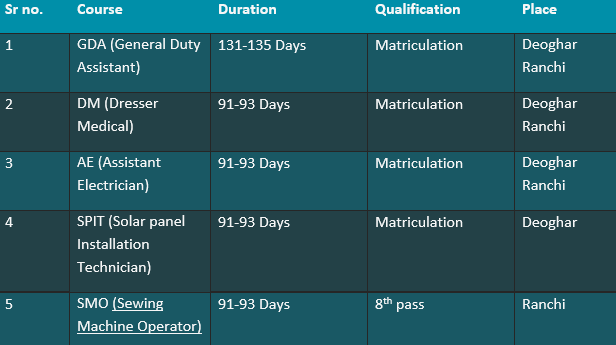
Skill training can also empower individuals to start their own businesses or freelance careers, leveraging their expertise to offer specialized services.
MOBILIZATION of candidates for enrolment
Introduction
India is a young country, with over 65% of the population under the age of 35. This demographic dividend presents a unique opportunity, but also significant challenges. Many young people lack access to quality education and training, leaving them unprepared for the evolving job market. Skills gaps and mismatches persist across key industries, constraining economic productivity and competitiveness.
The Mega Skills Project aims to address these gaps by:
- Providing large-scale, high-quality skills training to prepare youth for employment and entrepreneurship.
- Aligning skills development with the needs of the labor market, in close coordination with industry.
- Improving the accessibility and inclusivity of skills training, especially for disadvantaged and underserved communities.
- Building a robust, responsive, and sustainable skills ecosystem that can adapt to changing economic and technological trends.
Objectives
The key objectives of the mobilization for the Mega Skill Projects are:
- To raise awareness about the program and its benefits among potential candidates, their families, and communities across the country
- To ensure equitable access to the program, with targeted outreach and support for underrepresented and disadvantaged groups
- To build the administrative and operational capacity to manage a large-scale skills training program, from candidate registration to placement
- The Mega Skills Development Program aims to reach a diverse range of candidates, with a focus on the following target groups:
Youth
The primary target beneficiaries are young people aged 18-35, particularly those who have completed secondary education but lack access to quality higher education or vocational training opportunities. This age group represents the largest segment of India’s population and faces the highest rates of unemployment and underemployment.
Women
Women have historically been underrepresented in technical and vocational fields. The program will make concerted efforts to encourage and support the participation of women, with a target of female enrolment.
The program will prioritize the inclusion of candidates from disadvantaged communities, such as scheduled castes and tribes, religious minorities, and those from low-income backgrounds. Targeted outreach, financial assistance, and mentorship support will be provided to ensure equitable access. The project will be designed to be accessible and inclusive for persons with disabilities, with necessary accommodations and support services to enable their participation and success.
The project will strive to achieve all district of Jharkhand State coverage, with a focus on reaching candidates from rural, remote, and underserved areas, in addition to urban areas.
Need of Mobilization
The need for effective mobilization of candidates for the Mega Skill Project in Jharkhand is crucial for the successful implementation and achievement of the project’s objectives. Here are the key reasons why candidate mobilization is essential:
Awareness and Outreach
- Many potential candidates, especially in rural and remote areas, may not be aware of the Mega Skill Project and the opportunities it offers.
- Mobilization efforts, such as awareness campaigns, information sessions, and targeted outreach, are necessary to reach a wider audience and inform them about the project.
Talent Identification and Nurturing
- The Mega Skill Project seeks to identify and nurture talented individuals, especially from underserved regions, who may not have access to quality skill training opportunities.
- Effective mobilization can help in scouting and encouraging these talents to participate in the project, thereby unlocking their potential
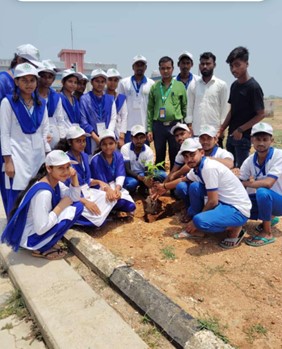
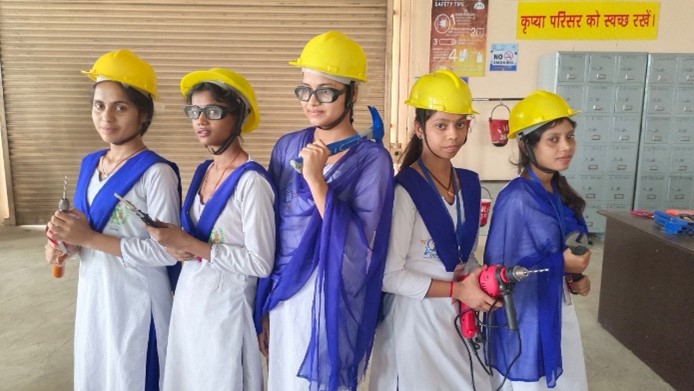
Why Partnership is crucial for Mobilization
Expanding Reach: partner brings its own network and reach to the table. By partnering with organizations that have existing connections within communities or industries, a skill program can tap into new candidates that it might not have been able to reach otherwise. This is particularly crucial for reaching marginalized or underserved populations.
Partnering with reputable organizations can enhance the credibility and legitimacy of a skill program. Candidates may be more likely to trust and participate in a program that is endorsed or supported by organizations they already know and trust. Partnerships can help ensure the long-term sustainability of a skill program
Overall, partnerships are essential for mobilizing candidates for skill programs because they allow for the efficient use of resources, expanded reach, tailored support, enhanced credibility, diverse perspectives, and long-term sustainability.


